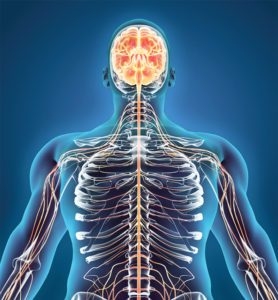Courtesy of Orthopedic Center of Florida
 Neuropathy and nerve damage affects millions of individuals in the United States every year. Numbness and tingling in the extremities are often the first signs that there is a disorder or issue with either your overall health, or with an impingement, spinal stenosis, or other possible nerve damage.
Neuropathy and nerve damage affects millions of individuals in the United States every year. Numbness and tingling in the extremities are often the first signs that there is a disorder or issue with either your overall health, or with an impingement, spinal stenosis, or other possible nerve damage.
Certain infections, nutritional deficiencies, and physical disorders like radiculopathy, sciatica, carpal tunnel, trauma or injury can affect the nerves. While diseases like diabetes, MS, Lupus, autoimmune disorders and other conditions can damage the peripheral nerves or the central nervous system.
Identifying the cause and location of nerve damage may direct your healthcare and treatment options.
Symptoms of Nerve Damage
• Tingling
• Numbness
• Burning
• Twitching
• Muscle weakness
• Heavy sensations in extremities
• Swelling
• Pain
• Muscle atrophy
• Impingements
• Limited range of motion
• Sweating too little or too much
• Sore muscles
• And more
Testing
Electromyography (EMG) and Nerve Conduction Study (NCS) can help your physician better understand your condition. Many times, both of these test are performed together for a more accurate diagnosis. Electrodiagnostic testing may help determine if any further diagnostic testing is needed, and help direct what treatment options are likely to be beneficial.
What is an NCS?
During a nerve conduction study, the measurements can detect if a nerve is damaged, as well as the amount of electrical current traveling through the nerves outside of the brain. For the study, small electrodes will be placed on your skin and a nerve conductivity device is used to stimulate specific nerves within your body. The test results are monitored and recorded for a specialist to review. NCS is a minimally invasive test and takes approximately 15-30 minutes to complete.
What is an EMG?
Our brains and spinal cord communicate with our nervous system through signals. During an electromyography test, the muscles are measured to see how they respond to the nerve to brain communication. EMG can detect neuromuscular disorders. The test consists of a tiny electrode needle that is placed into the affected muscle, and then a specialist will monitor and read the results of the electrical activity within the muscle.
Treatment
Along with medications and drug therapies, there are proven methods to lessen the symptoms of peripheral neuropathy. Depending on the cause, nerve damage may be reversible with proper treatment. Physical medicine provides alternative therapeutic and rehabilitating procedures that can offer significant pain relief. Depending on the cause, nerve damage may be reversible with proper treatment.
Treatment Options May Include:
• Manual stretching
• Laser Treatment
• Decompression
• Massage therapy
• Electrical nerve stimulation
• Therapeutic ultrasound
• Natural supplementation
• Pain Medications
How do these therapies work?
• Reduce swelling
• Reduce pain
• Increase endorphins
• Increase blood flow
• Stimulates natural nerve and tissue repair
Having a comprehensive evaluation to define your level of nerve damage, the source of the nerves involved, and the ancillary indications, are all critical steps to your particular outcome. A physical medicine expert will walk you through the best treatment options available.
Jaclyn Gorovoy Holt, D.O.
Physical Medicine and Rehabilitation
Jaclyn Holt, D.O. is a Board-Certified Fort Myers physiatrist with experience in treating patients who suffer from injuries or illnesses that affect the nerves, muscles, and joints, resulting in pain, weakness, or loss of function. Her focus is on designing comprehensive, patientcentered treatment plans to maximize function, mobility, and quality of life. Dr. Holt works with all of her patients to promote overall wellness primarily through therapeutic exercise, injections, nutrition, and/or medications. She personally performs Electromyography (EMG) and nerve conduction studies (NCS) to evaluate for numbness, weakness, carpal tunnel, neuropathy, and cervical and lumbar radiculopathy.
Dr. Holt does non-surgical management of neck, back and joint pain; botox injections for spasticity management and migraines; trigger point injections; and more. She works with the team of specialists at Orthopedic Center of Florida for interventional pain medicine procedures, orthopedic surgery or neurosurgery referrals as needed.
To schedule your appointment, please call 239-482-2663.
239-482-2663 | www.ocfla.net
12670 Creekside Lane, Fort Myers, FL 33919










